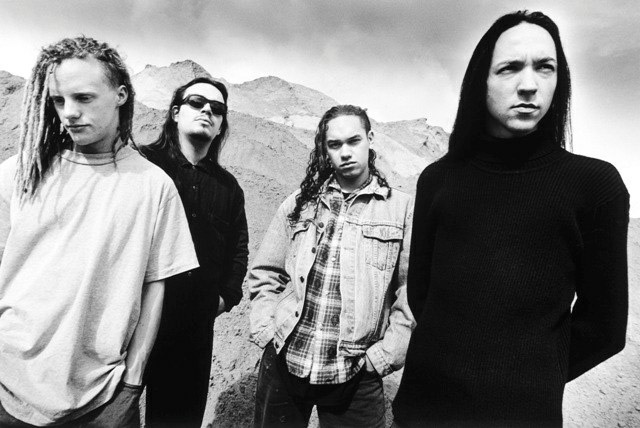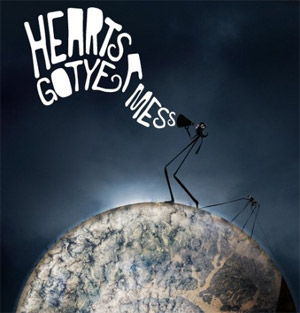Mess+Noise Storytellers interview: Shihad – ‘Deb’s Night Out’ and ‘Home Again’, May 2012
An interview for the Mess+Noise ‘Storytellers’ series. Excerpt below.
Storytellers: Shihad’s Jon Toogood
As part of our occasional Storytellers series and to coincide with the release of a new career-spanning documentary, ANDREW MCMILLEN talks to Shihad’s Jon Toogood about two tracks from their back catalogue: an unheralded gem from the mid-1990s and the most popular song they’ve written to date.
Shihad, one of New Zealand’s longest-running bands, have enjoyed a healthy career marked by experimentation. Now based in Melbourne, they’ve moved from industrial metal (1993 debut Churn) to include elements of pop and electronica (1996’s Shihad, 2008’s Beautiful Machine) while maintaining a central obsession with guitar-heavy rock music, as best exemplified on 1999’s The General Electric.
I met with singer Jon Toogood [pictured above, far right] upstairs at Brisbane venue Black Bear Lodge – he was in town playing shows with new outfit The Adults – to discuss two Shihad songs in-depth: ‘Deb’s Night Out’ from 1995’s nine-song Killjoy; and ‘Home Again’, the first track from the self-titled album that followed a year later. Much has been written about how much energy Toogood exhibits when fronting Shihad on stage, and the same remains true when he’s engaged in conversation.
‘Deb’s Night Out’
Andrew: I want to start with ‘Deb’s Night Out’. This song sticks out like a bit of a sore thumb, not only on that record but across your whole catalogue.
Jon: Musically, it was very, very heavily influenced by Skeptics, who we were listening to a lot at the time. They’re a New Zealand Flying Nun band, who were quite different again from the Flying Nun crew in the fact that they weren’t using guitars. It was a lot of sample-based shit, a lot of keyboards. They used Euphonics, or E-Sonics … Some fucking early sampler. They just sounded fucking unusual but they also had this edge … [that was] quite majestic, melodically. Hard to explain. Really beautiful, but really weird.
Anyway, we were listening to them a lot at that point. Phil [Knight, guitarist] wrote the loop the whole song’s based around, that thing that starts the whole song. That’s Phil on a sampler doing that. When he played it to me I was like, “Whoa, it’s really beautiful.” Then we wrote a bass line and then it was like, “Wow, that’s cool,” and then I just wrote a little poem over the top which was about a friend of my ex-wife’s who was a heroin addict. She came around to our house one night, in Wellington. At that point our daughter was one-year-old. She was asleep in the bedroom and her friend came around and was asking for money. We sort of chilled her out and then we ended up playing games, like Monopoly, but she was cheating. She also tried to steal some money so I actually said, “You – get the fuck out!” And it was pissing down with rain. So that’s where that song began.
It’s a pretty relaxed instrumental, paired with lyrics that describe a dark tale of a relationship dissolving.
It’s a song about disappointment, and a friend, really. She was more a friend of my ex-wife’s rather than mine. Oh, it was just the classic junkie thing. She was high; just never trust a junkie, really. She didn’t do anything to dispel that myth, or that cliche. She lived up to it. It was like, “Oh, that’s really disappointing”. I was a bit younger, so I learned, “Right, that’s actually how that drug works.” It was one of my earlier experiences with it. It was before Gerald [Dwyer], our manager, ended up dying of a morphine overdose.
I didn’t know that.
That happened after Killjoy [1995] and before the fish album [Shihad, 1996], which is probably a reason why the fish album is all over the place. Our heads were all over the place because we’d lost our manager.
Was that in New Zealand?
It was at the Big Day Out in Auckland. He managed us and another band called Head Like A Hole and we both had really blinding sets. We had seen him in the day; he was backstage and he’d rubbed his nose raw … because when he was on heroin, he’d scratch … The last thing I remember, it was really tragic, us all going [at the BDO], “You look a fucking mess, man. Get the fuck out of here! What the fuck are you doing?” He’s like, “There’s nothing wrong with me.” He went back to the hotel between our sets: we were on the main stage earlier, and Head Like A Hole were on the third stage later. He went back and had a hit, and it was really strong and he died. There was no one there at the hotel to help wake him up. By the time we’d got back to the hotel, someone knocked on his door, and then got it open, and he was dead on the floor. We thought it might have just happened, or something like that. But, yeah, he’d been dead for hours.
Did you know that he had a problem like that?
We knew that he used recreationally. But he had cleaned himself up for a while, and I think that’s what fucking killed him. Because he’d cleaned himself up for a while and then got some really pure morphine and basically decided to hit up what he used to do when he was using it more regularly – which kills a lot of people, anyway. There was no one there go to, “Hey, wake up.”
So, ‘Deb’s Night Out’; how soon after that night did you write that song?
Pretty much straight away, the day after. It was like – bam. [Guitarist] Phil [Knight] had given me that bit of music … It sounded like the feeling that I had, sort of bittersweet. Just sad, you know? And it was good timing. “Here you go Jon, I’ve got this music.” Great … We recorded it at York Street [Studios, Auckland], and we’d wanted it to be a loop rather than a live drum track. At that stage, as well, the studio was still new to us so everything was recorded to a two-inch tape. Before we were using ProTools properly, we went, “Oh fuck it, we’ll just cut a loop of Tom [Larkin] drumming.” So we actually cut it, had the splice going and we had to hold a drum stick in place [so that it could loop continuously] because there was only a small bit of tape. That’s why it’s got this weird skip in it, because it’s not quite perfect.
That’s another cute thing I remember about that track. I remember laying down those keyboards right at the end, because it was always just one loop. I thought after that last line, “Pray for the rain/To wash you far away”, it needed to “rain”, musically. That’s the most Skeptics-y part, that whole [sings descending chord progression aloud]. It’s that sort of anthemic thing that the Skeptics did, but with keyboards.
Did you ever see Deb again?
Actually, I probably did see her once or twice, but nothing too deep. She probably was a little bit scared of me once we kicked her out.
Does she know you wrote a song about her?
I don’t care! [Laughs] I don’t even know if she’s still alive.
At what point did you show your partner the song?
At what point did I show my ex-wife? I remember her being around while we were recording it in Auckland. She would have known what it was about. [Pause] I’m always a bit cagey with lyrics, even with the people who are close to me – even with guys in the band. They’re real personal and I was always real … I don’t want people to not like them, so I keep them to myself until the very moment where I can’t hide them anymore, because we’re releasing the fucking record. Which is probably why I’m so fucking overly sensitive to bad reviews! [Laughs] Because I live in denial all the time! [Laughs] I am getting better at it. I am getting better at going, “Oh, fuck it. I’ve been doing it 22 years, this is the idea I’ve got, boom.” But around that, I was, what, 26 when I wrote that? Still very, very uptight.
For the full interview, including questions about the classic Shihad track ‘Home Again’, visit Mess+Noise.
Speaking with Jon about these tracks in September 2011 was a huge thrill for me, as I’ve long loved Shihad; my overall Last.FM charts show that I’ve listened to that band more than any other since I joined Last.FM in October 2004.
The music video for ‘Deb’s Night Out‘ is embedded below.

 Four years before striking it big with their breakout, ARIA-nominated single ‘Don’t Fight It’ in 2008, Perth-based rock band The Panics released their third EP, Crack In The Wall. A stopgap between their 2003 debut LP House on a Street in a Town I’m From and 2005’s Sleeps Like A Curse, its seven tracks saw the still-young band yearning to find a sound of their own. Chief songwriter and singer Jae Laffer is the first to admit that their previous releases sounded like “guys imitating their heroes”, while doing a good job of it.
Four years before striking it big with their breakout, ARIA-nominated single ‘Don’t Fight It’ in 2008, Perth-based rock band The Panics released their third EP, Crack In The Wall. A stopgap between their 2003 debut LP House on a Street in a Town I’m From and 2005’s Sleeps Like A Curse, its seven tracks saw the still-young band yearning to find a sound of their own. Chief songwriter and singer Jae Laffer is the first to admit that their previous releases sounded like “guys imitating their heroes”, while doing a good job of it.